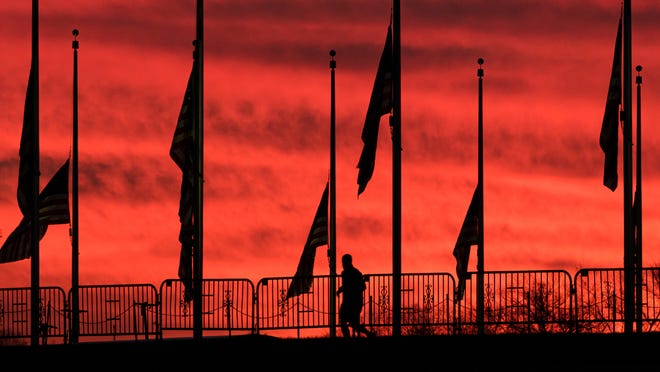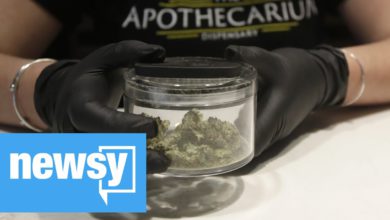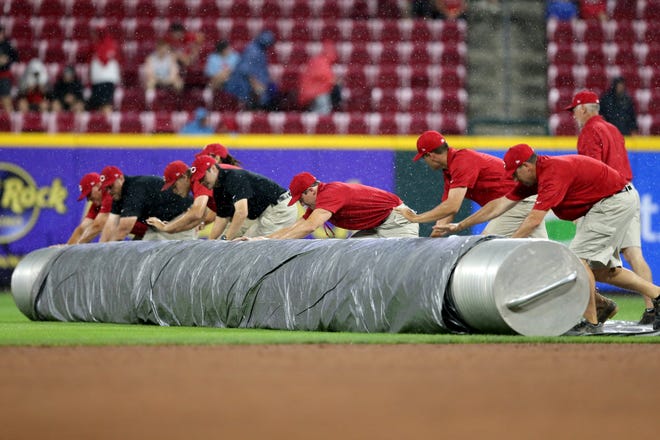
New daily cases of COVID-19 are rising slightly in the U.S., and public health officials are concerned. The U.S. has reported more than 80,000 new cases in recent days – daily totals not seen since mid-February, according to data from Johns Hopkins University.
Dr. Rochelle Walensky, director of the Centers for Disease Control and Prevention, said Friday she was "deeply concerned" about the trajectory of cases in the U.S. The most recent seven-day average of new cases was up by about 7% from the prior week, while hospitalizations have increased slightly and deaths have hovered, Walensky said.
Meanwhile, Europe is seeing a surge in infections, and several countries are reimposing, tightening or extending restrictions. Italy reimposed lockdown measures last week. France and Poland reintroduced partial lockdowns this week. And the Czech Republic voted to extend its state of emergency.
Also in the news:
►Britain’s vaccines minister says booster shots designed to fight new variants of the coronavirus should be ready for distribution to people over 70 by September.
►New York on Friday launched the nation's first "vaccine passports" system. The certification, called the Excelsior Pass, will be useful first at large-scale venues like Madison Square Garden, but next week will be accepted at dozens of event, arts and entertainment venues statewide.
►Rejecting arguments by Texas Attorney General Ken Paxton, a state judge declined Friday to block Austin and Travis County pandemic orders requiring employees and customers to wear a face covering in local businesses. Paxton is expected to appeal the ruling.
►About half of U.S. states will open up their vaccination efforts to all adults by mid-April, White House COVID-19 Response Coordinator Jeff Zients said Friday. In all, 46 states and the District of Columbia have already pledged to meet President Joe Biden's goal of having all Americans eligible for a vaccine by May 1.
►The head of the World Health Organization is asking rich countries to donate at least 10 million coronavirus vaccines so the U.N. health agency can reach its goal of vaccination in all countries within the first 100 days of 2021.
? Today's numbers: The U.S. has over 30.1 million confirmed coronavirus cases and more than 548,000 deaths, according to Johns Hopkins University data. The global totals: 126.3 million cases and 2.7 million deaths. More than 180.6 million vaccine doses have been distributed in the U.S. and 140.1 million have been administered, according to the CDC.
? What we're reading: For a year, the coronavirus preyed on the vulnerable and spread uncontrollably throughout the U.S., upending daily life. It prompted experts to repeatedly warn that simple joys like a family holiday gathering could "kill grandma." But now, nearly half of Americans over the age of 65 are fully vaccinated, and heartfelt reunions are happening across the nation.
USA TODAY is tracking COVID-19 news. Keep refreshing this page for the latest updates. Want more? Sign up for our Coronavirus Watch newsletter for updates to your inbox and join our Facebook group.
Study: COVID-19 vaccines are safe and effective, even for babies
COVID-19 vaccines are extremely effective at protecting pregnant women and likely provide protection for their babies as well, according to a new study.
The research, published Thursday in the American Journal of Obstetrics and Gynecology, examined 131 vaccine recipients, including 84 who were pregnant, 31 who were breastfeeding, and 16 who weren't pregnant as a control group.
Earlier studies suggested the COVID-19 vaccines from Pfizer-BioNTech and Moderna would be safe and effective. But this is the largest study to date looking at the immune responses of pregnant and lactating women to vaccination. Read more.
– Karen Weintraub
Former CDC director believes the coronavirus escaped from a lab in China. Scientists are dubious
Robert Redfield, former director of the Centers for Disease Control and Prevention, told CNN Friday he believes the virus that causes COVID-19 was accidentally released from a lab in Wuhan, China.
He offered no explanation for this idea other than to say as a virologist, he does not believe the virus could have been so contagious when it jumped directly from an animal to a person. Instead, he contends it was manipulated in a Wuhan research laboratory to become more contagious and then accidently released by a worker in September or October 2019, a few months before coming to public attention.
Several scientists said Redfield's theory did not pass the scientific smell test. "There's a fundamental difference between having a theory and testing a theory and showing evidence that your theory is a fact," said Paul Duprex, a virologist and director of the center for vaccine research at the University of Pittsburgh.
Duprex, who runs a biosafety level three lab, which handles dangerous pathogens, said he would never rule out the possibility of human error but that he has seen no evidence to suggest the virus first emerged from a lab. Read more.
– Karen Weintraub
Fauci: Study will look at if vaccinated college students can spread COVID
A new study launched Thursday will examine whether COVID-19 can spread from vaccinated individuals to their close contacts, Dr. Anthony Fauci said Friday.
Fauci said the study will span 12,000 college students at more than 20 universities over five months. Around 6,000 students in the study will be vaccinated immediately with the Moderna vaccine while the other half will be vaccinated four months later.
Study participants will then identify their close contacts, and all people will provide swabs to determine whether vaccinated people can transmit the virus to their close contacts.
"We hope that in the next five or so months we'll be able to answer the very important question about whether vaccinated people get infected asymptomatically and if they do, do they transmit the infection to others," Fauci said.
Whitmer again vetoes virus aid after no legislative deal
Gov. Gretchen Whitmer on Friday again vetoed about $652 million in proposed COVID-19 relief spending after the Michigan Legislature passed it without negotiating with her administration.
Majority Republicans reapproved the funding following the Democratic governor's first veto weeks ago during a fight over an attempt to link federal funds to her agreeing to cede certain pandemic powers solely to local health departments.
One bill proposed $405 million in state-funded business relief and a $150 million deposit into the unemployment insurance fund. Another would have given $87 million in federal funds to private schools and $10 million to reimburse parents for summer school expenses.
In a letter to lawmakers, Whitmer said she vetoed the measures because they primarily included spending she previously rejected.
– The Associated Press
Contributing: The Associated Press
Source link









